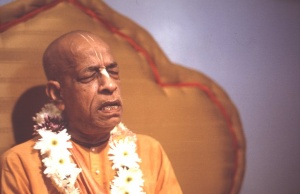SB 5.17.15: Difference between revisions
m (1 revision(s)) |
(Vanibot #0054 edit - transform synonyms into clickable links, which search similar occurrences) |
||
| (One intermediate revision by one other user not shown) | |||
| Line 1: | Line 1: | ||
{{info | {{info | ||
|speaker= | |speaker=Śukadeva Gosvāmī | ||
|listener=King | |listener=King Parīkṣit | ||
}} | }} | ||
[[Category:Srimad-Bhagavatam - Canto 05 Chapter 17]] | |||
[[Category:Bhagavatam Verses Spoken by Sukadeva Gosvami - Vanisource|051715]] | |||
<div style="float:left">'''[[Srimad-Bhagavatam]] - [[SB 5|Fifth Canto]] - [[SB 5.17: The Descent of the River Ganges|Chapter 17: The Descent of the River Ganges]]'''</div> | |||
<div style="float:right">[[File:Go-previous.png|link=SB 5.17.14]] '''[[SB 5.17.14]] - [[SB 5.17.16]]''' [[File:Go-next.png|link=SB 5.17.16]]</div> | |||
{{RandomImage}} | |||
==== TEXT 15 ==== | ==== TEXT 15 ==== | ||
<div class="verse"> | |||
<div | :ilāvṛte tu bhagavān bhava eka eva pumān na hy anyas tatrāparo | ||
ilāvṛte tu bhagavān bhava eka eva pumān na hy anyas tatrāparo nirviśati bhavānyāḥ śāpa-nimitta-jño yat-pravekṣyataḥ strī-bhāvas tat paścād vakṣyāmi | :nirviśati bhavānyāḥ śāpa-nimitta-jño | ||
:yat-pravekṣyataḥ strī-bhāvas tat paścād vakṣyāmi | |||
</div> | </div> | ||
| Line 14: | Line 21: | ||
==== SYNONYMS ==== | ==== SYNONYMS ==== | ||
<div class="synonyms"> | |||
<div | ''[//vanipedia.org/wiki/Special:VaniSearch?s=ilāvṛte&tab=syno_o&ds=1 ilāvṛte]'' — in the tract of land known as Ilāvṛta-varṣa; ''[//vanipedia.org/wiki/Special:VaniSearch?s=tu&tab=syno_o&ds=1 tu]'' — but; ''[//vanipedia.org/wiki/Special:VaniSearch?s=bhagavān&tab=syno_o&ds=1 bhagavān]'' — the most powerful; ''[//vanipedia.org/wiki/Special:VaniSearch?s=bhavaḥ&tab=syno_o&ds=1 bhavaḥ]'' — Lord Śiva; ''[//vanipedia.org/wiki/Special:VaniSearch?s=eka&tab=syno_o&ds=1 eka]'' — only; ''[//vanipedia.org/wiki/Special:VaniSearch?s=eva&tab=syno_o&ds=1 eva]'' — certainly; ''[//vanipedia.org/wiki/Special:VaniSearch?s=pumān&tab=syno_o&ds=1 pumān]'' — male person; ''[//vanipedia.org/wiki/Special:VaniSearch?s=na&tab=syno_o&ds=1 na]'' — not; ''[//vanipedia.org/wiki/Special:VaniSearch?s=hi&tab=syno_o&ds=1 hi]'' — certainly; ''[//vanipedia.org/wiki/Special:VaniSearch?s=anyaḥ&tab=syno_o&ds=1 anyaḥ]'' — any other; ''[//vanipedia.org/wiki/Special:VaniSearch?s=tatra&tab=syno_o&ds=1 tatra]'' — there; ''[//vanipedia.org/wiki/Special:VaniSearch?s=aparaḥ&tab=syno_o&ds=1 aparaḥ]'' — besides; ''[//vanipedia.org/wiki/Special:VaniSearch?s=nirviśati&tab=syno_o&ds=1 nirviśati]'' — enters; ''[//vanipedia.org/wiki/Special:VaniSearch?s=bhavānyāḥ&tab=syno_o&ds=1 bhavānyāḥ] [//vanipedia.org/wiki/Special:VaniSearch?s=śāpa&tab=syno_o&ds=1 śāpa]-[//vanipedia.org/wiki/Special:VaniSearch?s=nimitta&tab=syno_o&ds=1 nimitta]-[//vanipedia.org/wiki/Special:VaniSearch?s=jñaḥ&tab=syno_o&ds=1 jñaḥ]'' — who knows the cause of the curse by Bhavānī, the wife of Lord Śiva; ''[//vanipedia.org/wiki/Special:VaniSearch?s=yat&tab=syno_o&ds=1 yat]-[//vanipedia.org/wiki/Special:VaniSearch?s=pravekṣyataḥ&tab=syno_o&ds=1 pravekṣyataḥ]'' — of one who forcibly enters that tract of land; ''[//vanipedia.org/wiki/Special:VaniSearch?s=strī&tab=syno_o&ds=1 strī]-[//vanipedia.org/wiki/Special:VaniSearch?s=bhāvaḥ&tab=syno_o&ds=1 bhāvaḥ]'' — transformation into a female; ''[//vanipedia.org/wiki/Special:VaniSearch?s=tat&tab=syno_o&ds=1 tat]'' — that; ''[//vanipedia.org/wiki/Special:VaniSearch?s=paścāt&tab=syno_o&ds=1 paścāt]'' — later; ''[//vanipedia.org/wiki/Special:VaniSearch?s=vakṣyāmi&tab=syno_o&ds=1 vakṣyāmi]'' — I shall explain. | ||
</div> | </div> | ||
| Line 22: | Line 28: | ||
==== TRANSLATION ==== | ==== TRANSLATION ==== | ||
<div class="translation"> | |||
<div | |||
Śukadeva Gosvāmī said: In the tract of land known as Ilāvṛta-varṣa, the only male person is Lord Śiva, the most powerful demigod. Goddess Durgā, the wife of Lord Śiva, does not like any man to enter that land. If any foolish man dares to do so, she immediately turns him into a woman. I shall explain this later [in the Ninth Canto of Śrīmad-Bhāgavatam]. | Śukadeva Gosvāmī said: In the tract of land known as Ilāvṛta-varṣa, the only male person is Lord Śiva, the most powerful demigod. Goddess Durgā, the wife of Lord Śiva, does not like any man to enter that land. If any foolish man dares to do so, she immediately turns him into a woman. I shall explain this later [in the Ninth Canto of Śrīmad-Bhāgavatam]. | ||
</div> | </div> | ||
__NOTOC__ | |||
<div style="float:right; clear:both;">[[File:Go-previous.png|link=SB 5.17.14]] '''[[SB 5.17.14]] - [[SB 5.17.16]]''' [[File:Go-next.png|link=SB 5.17.16]]</div> | |||
__NOTOC__ | |||
__NOEDITSECTION__ | |||
Latest revision as of 22:08, 18 February 2024

A.C. Bhaktivedanta Swami Prabhupada
TEXT 15
- ilāvṛte tu bhagavān bhava eka eva pumān na hy anyas tatrāparo
- nirviśati bhavānyāḥ śāpa-nimitta-jño
- yat-pravekṣyataḥ strī-bhāvas tat paścād vakṣyāmi
SYNONYMS
ilāvṛte — in the tract of land known as Ilāvṛta-varṣa; tu — but; bhagavān — the most powerful; bhavaḥ — Lord Śiva; eka — only; eva — certainly; pumān — male person; na — not; hi — certainly; anyaḥ — any other; tatra — there; aparaḥ — besides; nirviśati — enters; bhavānyāḥ śāpa-nimitta-jñaḥ — who knows the cause of the curse by Bhavānī, the wife of Lord Śiva; yat-pravekṣyataḥ — of one who forcibly enters that tract of land; strī-bhāvaḥ — transformation into a female; tat — that; paścāt — later; vakṣyāmi — I shall explain.
TRANSLATION
Śukadeva Gosvāmī said: In the tract of land known as Ilāvṛta-varṣa, the only male person is Lord Śiva, the most powerful demigod. Goddess Durgā, the wife of Lord Śiva, does not like any man to enter that land. If any foolish man dares to do so, she immediately turns him into a woman. I shall explain this later [in the Ninth Canto of Śrīmad-Bhāgavatam].